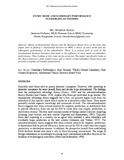| dc.contributor.author | Kamal, Md. Shawkat | |
| dc.date.accessioned | 2012-02-28T05:31:11Z | |
| dc.date.available | 2012-02-28T05:31:11Z | |
| dc.date.issued | 2011 | |
| dc.identifier.uri | http://hdl.handle.net/10361/1613 | |
| dc.description.abstract | Based on Institutional Theory and the Resource Based View of the firm, this paper aims at finding a relationship between an MNC’s choice of entry mode and the subsequent performance of the subsidiaries. There is a serious lack of work in the international business literature that looks at the influence of entry mode on subsidiary performance. Thus looking at this issue merits attention. The paper specifically looks at the choice between a joint venture entry, and a wholly owned subsidiary based entry and provides a number of testable propositions. | en_US |
| dc.language.iso | en | en_US |
| dc.publisher | Mustang Journals | en_US |
| dc.relation.ispartofseries | Mustang Journal of Business and Ethics;Vol.2, No., p. 20-29 | |
| dc.subject | Subsidiary Performance | en_US |
| dc.subject | Joint Venture | en_US |
| dc.subject | Wholly Owned Subsidiary | en_US |
| dc.subject | Host Country Experience | en_US |
| dc.subject | Institutional Theory | en_US |
| dc.subject | Resource Based View | en_US |
| dc.title | Entry mode and subsidiary performance in emerging economics | en_US |
| dc.type | Article | en_US |

